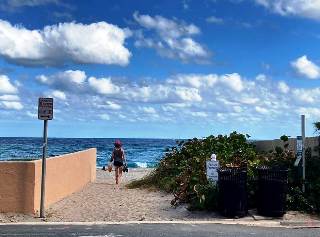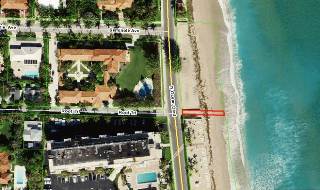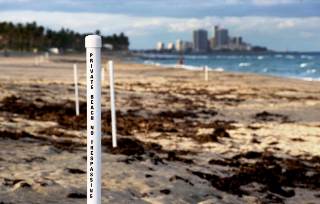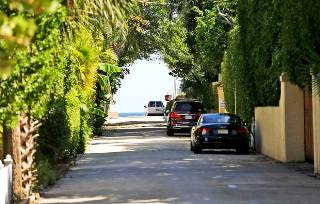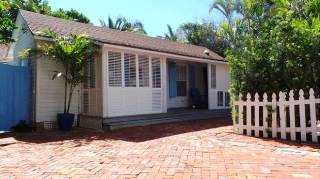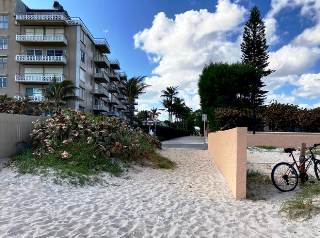|
Article Courtesy of The Palm Beach Post
By Kimberly Miller
Published January 9, 2021
Tucked inside the opulence of Palm Beach
is a street dotted with shotgun-style cottages more
reminiscent of Hemingway’s Key West than flamboyant Henry
Flagler.
Root Trail, a modest passage without the
pomp of manicured swales, leads east to the Atlantic through
a simple beach cut-through slotted between private
properties. But the once obscure conduit from road to ocean
is now embroiled in a century-old mystery and legal
tug-of-war that could see the path padlocked forever.
|
Since a time when the
island was predominantly tangles of black mangrove, saw
palmetto and cabbage palms, beachgoers have used Root Trail
to reach the ocean. Even as the island fortified its shores
with walls and gates and restrictions that limited hours,
outlawed surfing and forbade “throwing missiles,” the Root
Trail beach entrance remained open.
Then, earlier this year, the Town of Palm
Beach got a permit request to install a 6-foot-tall locked
gate along the 20-foot-wide opening. Two entities say they
own the property — Root Trail Partners claims the north 10
feet, while the Ocean Towers Condominium Association claims
the south 10 feet.
“I questioned how they could get ownership to something
dedicated to the entire subdivision,” said town zoning
manager Paul Castro about Root Trail Partners during an Oct.
10 council meeting.
The question would uncover a puzzle of
more-than-100-year-old documents, some carefully handwritten
in a delicate cursive that still listed Palm Beach as part
of Dade County — before their separation in 1909. They led
town officials to believe earlier this year that the town
itself owned the land, which was deeded to it by one of the
tony enclave’s founders. |
|
At the end of Root Trail in the Town of Palm Beach is
a disputed beach entrance that has been used by the public for
decades, but may actually be owned by private entities. Photo
courtesy Eddie Ritz
|
Public vs. private
beach access
With a burgeoning population of mainlanders, Palm Beach has
struggled recently to balance public beach access with the
privacy and order expected by the well-heeled community.
It’s a tumult that exacerbates the Root Trail stalemate as
public beach entrances face more constraints in attempts to
limit non-islanders’ access, and even block Palm Beachers
who don’t live on Root Trail from using the beach path.
|
“I doubt this is a
situation that is unique to Palm Beach,” said Liz Maass, a
retired judge and island resident who is working with the
parties to sort out ownership. “I think you just have people
with bigger egos and more money here.”
And while a squabble over a 20-foot entrance may seem petty,
Maass, whose sister lives near Root Trail, said the town
shouldn’t just surrender public property if it thinks it has
a right to it.
“But if it’s private, then it’s private, and my sister will
have to learn to live with it,” Maass said.
Enoch Root and his wife Victoria moved to Palm Beach from
Chicago in the late 1800s near the time when Flagler opened
the luxurious Georgian-style Royal Poinciana Hotel, the
extravagant beachfront Breakers resort and the lavish Gilded
Age mansion Whitehall.
The Roots bought a slice of land from the Lake Worth Lagoon
to the ocean. Enoch served as the town’s postmaster and also
was on the first town council after voting in 1911 to
incorporate as a way of escaping annexation by West Palm
Beach. |
|
An image from the Palm Beach County Property
Appraiser's website shows outlined in red the disputed piece of
property that allows people to access the beach at the end of Root
Trail.
|
But Enoch, who is buried next to his wife
at the Woodlawn Cemetery in West Palm Beach, was also a
painter. He bought cottages on the then sandy road that
would ultimately bear his surname, renting them to artists.
|
That creative energy
remains today in the Root Trail bungalows, some 95 years old
and smaller than 1,000 square feet, but valued at more than
$1 million. “Margaritaville” singer Jimmy Buffett and his
wife, Jane, own two properties on Root Trail.
Some town residents said the open beach access at the end of
the street is part of the neighborhood’s charm.
“I was surprised that there was even debate about whether it
was public,” said lifelong Palm Beach resident Kent Anderson
about the Root Trail beach entrance. “I’m 36 years old and
I’ve been using — and it has definitely been public access
for people — since at least the early 1980s.”
In an October memo, town officials said a quit claim deed
recorded in 1912 and signed by the Roots gave the 10
northern feet of the beach access trail to the town as a
public road to be kept open and maintained by the town for
the benefit of the public and the Root Trail lot owners.
“This contradicts the claim of Root Trail
Partners, LLC, that it privately owns title to the beach
access property free and clear of any rights of the public,”
the memo said. |
|
The Town Council is holding a public meeting
Monday to address beach access and public use of the eight-block
stretch between Sunset Avenue and Wells Road. As of December 3,
plastic posts at the erosion control line are in place to advise
where beachgoers can be cited for trespassing.
|
A second quit claim deed filed the same year and signed by
former resident Dorinda H. Brelsford also gives the southern
half of the path to the town, the memo said.
Palm Beach County’s property appraiser’s
office shows the Ocean Towers Condominium as the owner of
the south side of the trail, with the north side owned by
Root Trail Partners. Castro said at the October meeting that
the town isn’t disputing the condominium ownership.
|
A 30-year-old mystery
The north 10 feet, however, is a different story, and how it
got into private ownership is still uncertain.
Guy Rabideau, an attorney for Root Trail Partners, said the
property was bought at a tax deed auction after a tax sale
certificate was filed in 1991. Tax deeds are sold after an
investor has bought delinquent tax debt — called
certificates — from the county with the ability to get
repaid with interest by the property owner.
If the owner doesn’t pay off the debt in a certain number of
years, the certificate holder can file for a tax deed on the
property and sell it at auction. County records reflect a
tax deed for the northern 10 feet of the Root Trail beach
access entrance was sold to PB Harizons Inc. for $4,560 in
March 1995. The land sold again in 2001, and was sold again
to Root Ocean Property in 2008 for $25,000. The same year,
property records show it was sold by special warranty deed
to Root Trail Partners for $5,000. |
|
Tree-lined Root Trail ends with a view of the ocean.
|
The town says the tax deed sale
“unknowingly conveyed title to the town’s public
right-of-way to a private entity.”
|
“Town staff questions
how three previous owners and Root Trail Partners, LLC, took
title to the property since 1995,” the October memo states.
“How could a private entity make application; pay the taxes
and obtain a tax deed from the Palm Beach County Tax
Collector on what appears to be public property?”
Still, Rabideau also argues the Root’s deed to the town was
never legitimate anyway because the couple sold lots that
had dedicated use of that beach access. They couldn’t give
land to the town that was already part of someone else’s
platted property.
“I realize that this is an uncomfortable situation,” said
Palm Beach town councilman Lew Crampton at a meeting earlier
this month. “But we as a body need to start thinking about
how seriously we are going to take this public access
issue.” The Root
Trail controversy came to a head after residents who own
properties that extend onto a private part of the beach
complained about rowdy beachgoers, overflow garbage and
trespassing that got worse as people sought respite from
Covid-19 restrictions during the summer. |
|
This century-old pioneer home owned by singer Jimmy
Buffett was recommended to become a landmark in Palm Beach.
|
The undisputed public entrances to the beach in an
eight-block area north of The Breakers are Sunset Avenue,
Dunbar Road and Wells Road, but Root Trail is widely used
because it was close to free two-hour public parking.
|
In response to
resident complaints, the town has since changed areas of
free parking to $5-an-hour, increased police presence, and
installed gates at Sunset, Dunbar and Wells that are locked
between 9:30 p.m. and 5:30 a.m.
Rabideau said his clients want to work with Root Trail
property owners so that they can have access to the beach
through the entrance, possibly with a coded lock. The
general public would still be blocked.
“The owners of Root Trail Partners are and have always been
civic-minded, and that will continue,” he said in a letter
to the town council.
If Root Trail Partners and the condominium are allowed to
install the gate, the area will be landscaped, maintained,
and a protective berm added at no expense to taxpayers,
Rabideau said. If the town asserts its ownership “crime will
continue, if not increase, and the quiet enjoyment of their
homes will be lost to all residents on Root Trail,” he said
in the letter.
Town attorney Skip Randolph is considering a legal maneuver
called “prescriptive easement” that could allow the Root
Trail access to remain open to the public. |
|
At the end of Root Trail in the Town of Palm Beach is
a disputed beach entrance that has been used by the public for
decades, but may be private.
|
Deputy Town Manager Jay Boodheshwar said
Randolph expects to present his findings and recommendations
the first week of 2021.
“If everyone could agree on what the
facts are, the law will lead you to a conclusion,” Maass
said. “The hard part is getting people to agree on what the
facts are.”
 |
|
The beach access gate at Dunbar Road in Palm Beach is
locked at night. The beach is closed sunset to sunrise.
|
|
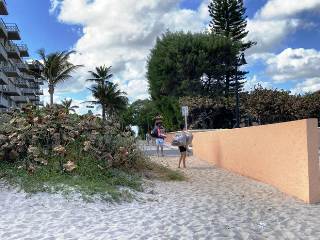 |
| At the end of Root
Trail in the Town of Palm Beach is a
disputed beach entrance that has been
used by the public for decades, but may
be private. |
|
|
